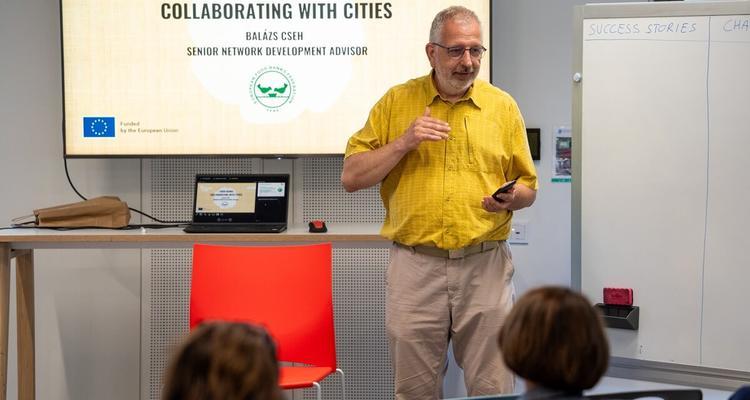
Unlocking the Potential: Food Banks and Cities Collaborating for Sustainable Food Systems
In the spirit of building more resilient and sustainable food systems, the FEBA (European Food Banks Federation) Annual Convention in Dublin brought together stakeholders from across Europe. As part of the event, FoodCLIC hosted a dedicated workshop to explore the untapped potential of collaboration between food banks and municipalities.
The session served both as a forum for knowledge exchange and as a moment to reflect on current practices, challenges, and future opportunities. Framed within the FoodCLIC project, which aims to foster more sustainable urban rural food systems across Europe, the workshop focused on how local governments and food banks can strengthen cooperation to tackle food waste, support vulnerable populations, and advance food system transformation.
A Shared Recognition of Untapped Potential
Participants shared their experiences engaging with local authorities. A clear takeaway emerged: there is still substantial untapped potential in partnerships between cities and food banks. While some reported strong relationships with municipal actors, others described limited or even absent collaboration.
Nevertheless, good practices from across Europe offered inspiration. In Belgium, municipalities provide funding and access to beneficiary databases. In France, a digital platform connects schools and hospitals with local charities to efficiently redistribute surplus food. In Hungary, an initiative in Budapest links surplus from school canteens to social service providers, supported by a cold chain system and last-mile delivery via the food courier company Wolt.
These examples showed the diverse roles municipalities can play: as donors (e.g., school kitchens), facilitators (e.g., engaging local charities), enablers (e.g., offering storage or transport), and communicators who raise awareness among citizens and businesses.
Barriers to Collaboration
Despite promising case studies, several challenges were also identified:
- Asymmetry in knowledge and communication: Municipalities often lack awareness of food banks' operations, and vice versa.
- Institutional fragmentation: Changing political cycles and differing departmental responsibilities can slow down progress.
- Lack of dedicated infrastructure or regulation: For example, the absence of food safety guidelines can hinder redistribution of cooked meals.
The Role of FoodCLIC
FoodCLIC aims to strengthen rural-urban linkages and promote inclusive, sustainable food systems. Cities such as Budapest and Barcelona are piloting innovative approaches, involving surplus food redistribution and city-level food strategies.
Our workshop reaffirmed the relevance of FoodCLIC’s mission. Urban food strategies, circular economy platforms, and sustainability initiatives can all serve as entry points for food banks seeking stronger municipal engagement. In turn, food banks can offer cities practical tools to address food poverty and reduce waste.
Next Steps
As one participant summarized: "Every food bank is located in a city. This should be a natural alliance." However, making this a reality requires more than goodwill—it calls for strategic alignment, communication, and innovation.
We encourage cities and food banks across Europe to explore the FoodCLIC Knowledge Hub and connect with existing partners. By bridging local governance with food redistribution expertise, we can build food systems that are not only more sustainable, but also more just.
- Written by our guest author and consortium member Balázs Cseh (FEBA)
Publishing date:
FOODCLIC. We are connecting people, food, policy & places.
FoodCLIC is a four-year project funded by the EU. The project runs from September 2022 to February 2027. The acronym FoodCLIC stands for 'integrated urban FOOD policies – developing sustainability Co-benefits, spatial Linkages, social Inclusion and sectoral Connections to transform food systems in city-regions

